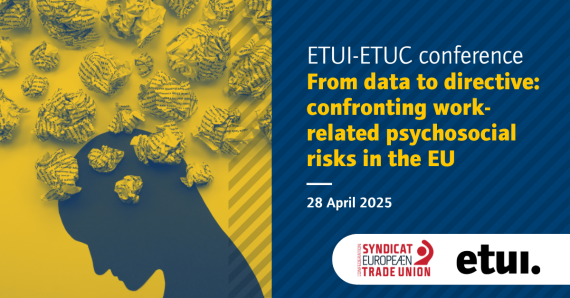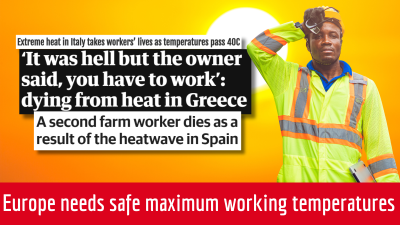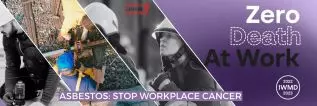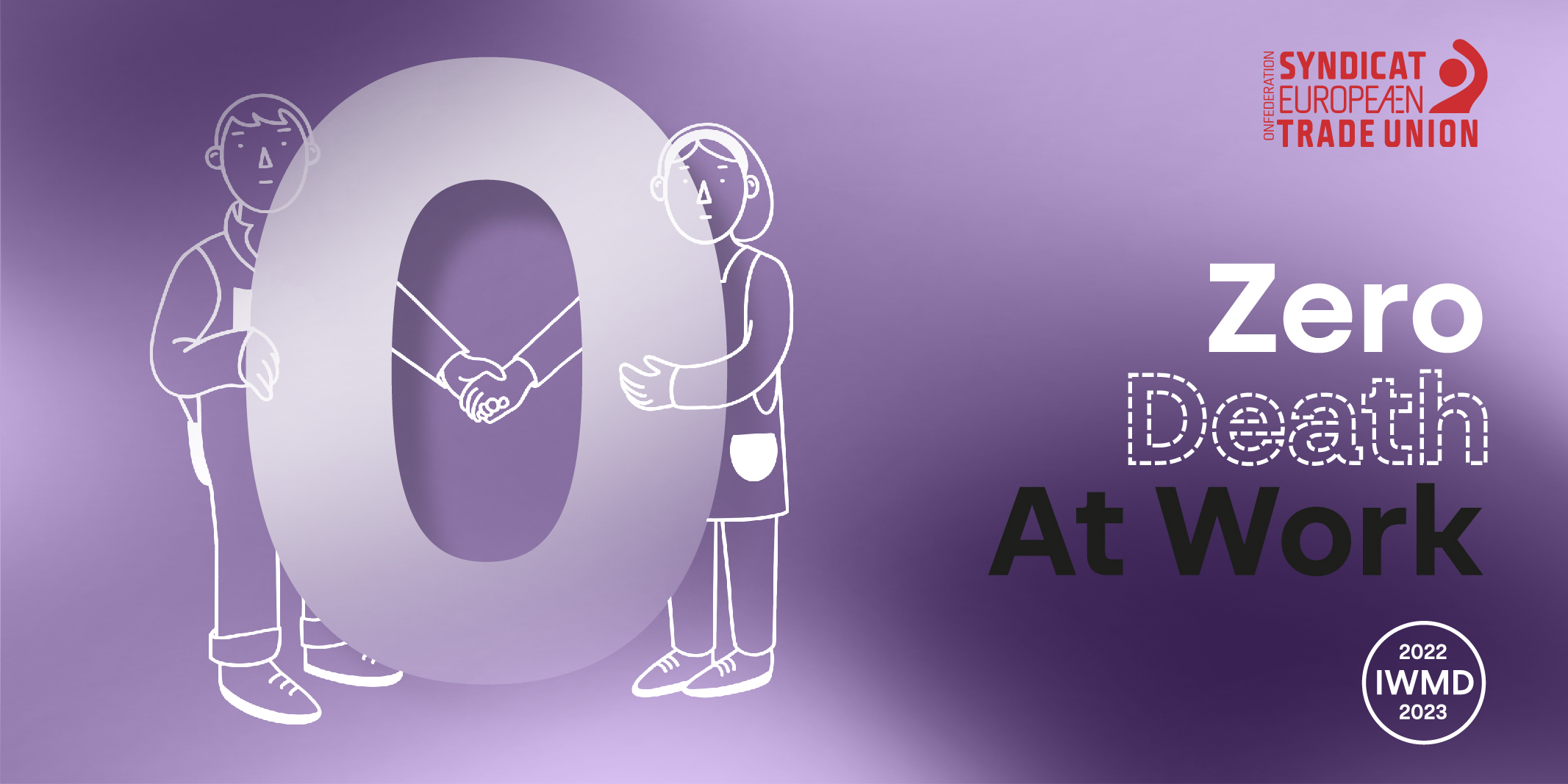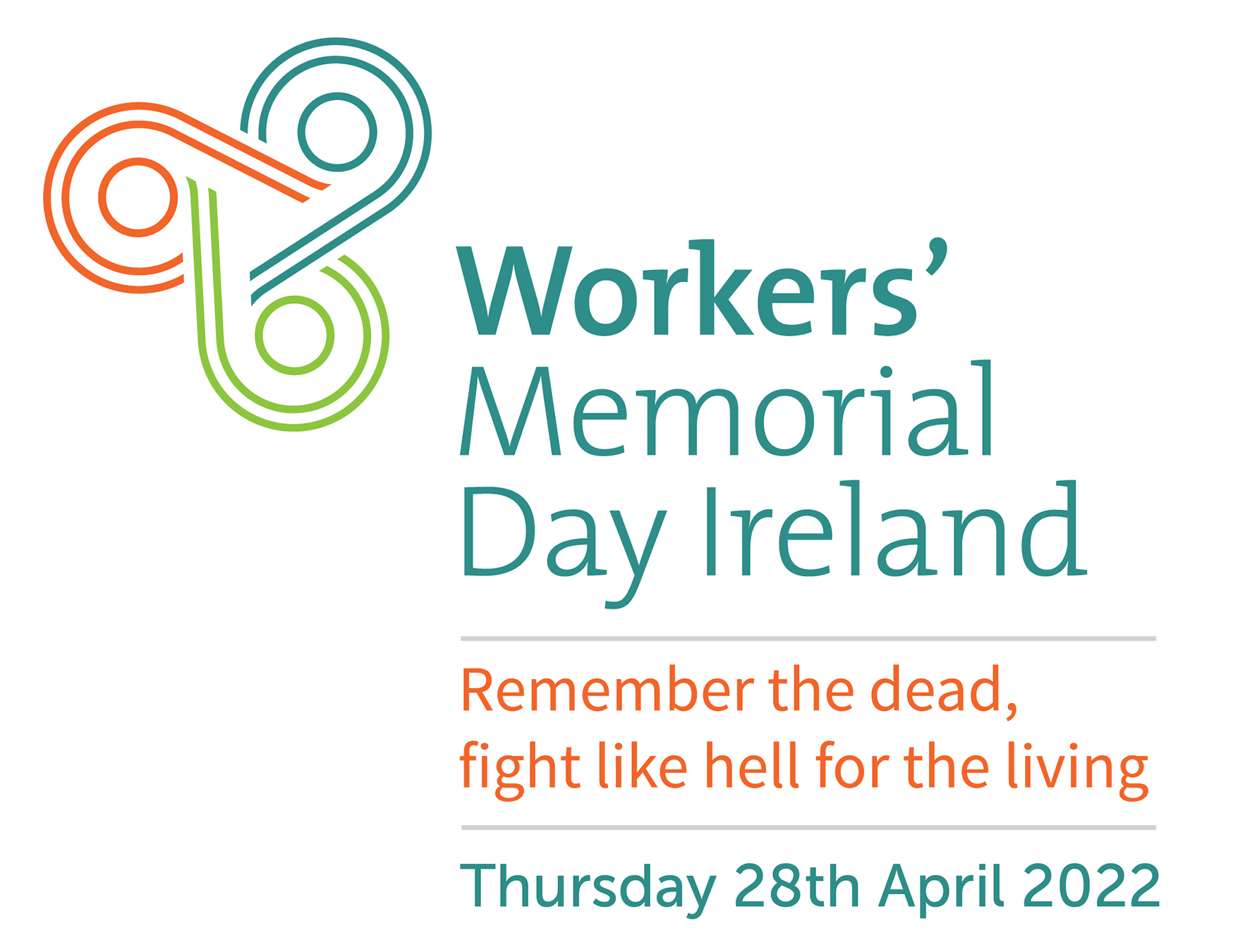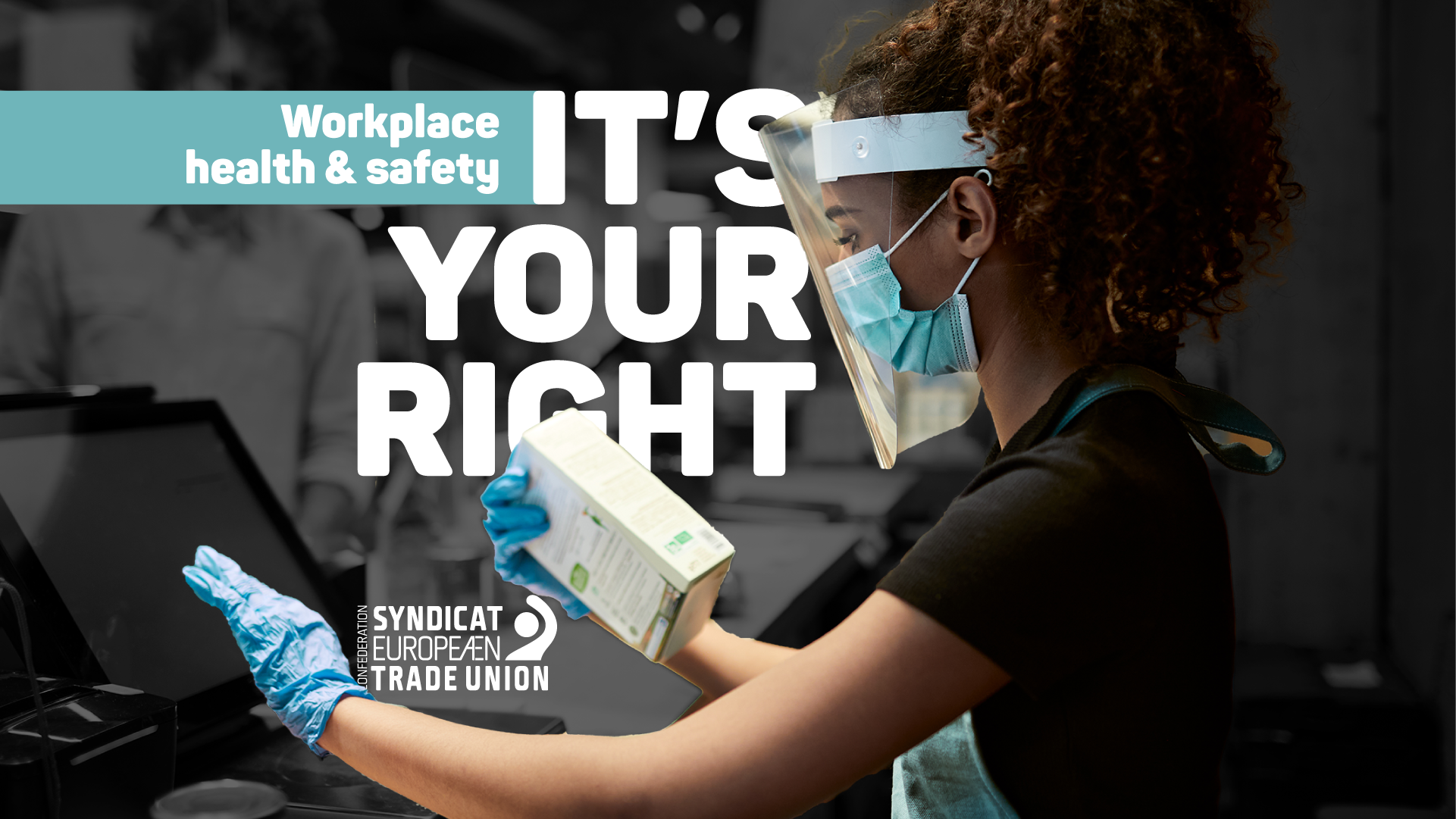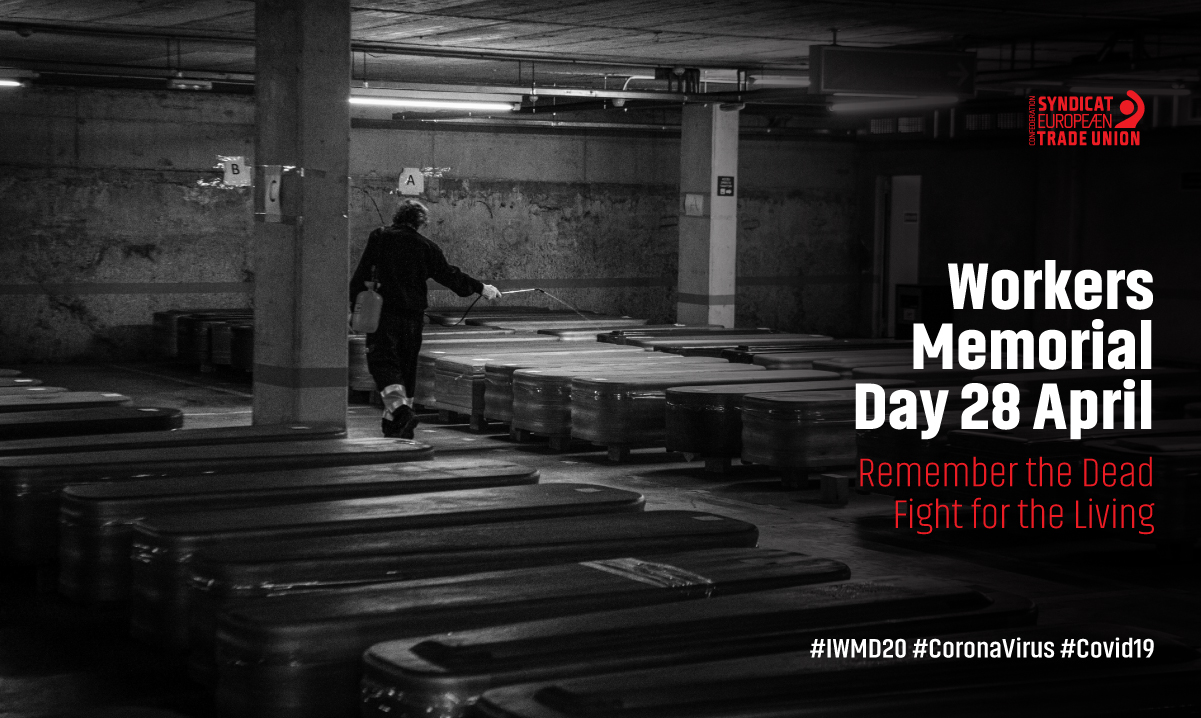Victims of occupational cancer and their families are today, on International Workers Memorial Day, calling on EU leaders to give workers the highest possible level of protection from asbestos.
Around 90,000 people lose their lives to asbestos-related cancer in the EU every year, making it the leading cause of workplace fatalities.
Between 4 and 7 million workers across the EU are exposed to asbestos and that number is expected to grow by 4% over the next decade as a result of building renovations as part of the EU Green Deal.
The EU is currently reviewing the asbestos exposure limit but the European Commission and European Council want to keep it at a dangerously high level in order to minimise costs for businesses.
To show the consequences of such a decision, trade unions are publishing the testimonies of those whose lives have been blighted by cancer caused by exposure to asbestos at work. They include:
- Two sisters who lost both parents: “A disease with no possibility of treatment, terribly distressing for the whole family… it suffocates you.”
- A retired transport worker: “This is like a sword of Damocles. At any moment, I could pass away.”
- Two brothers who lost both parents: “Death was ultimately redemption from torment we had to endure.”
- Campaigner who lost parents and brothers: “Asbestos is still in buildings of the ’60s and ’70s, getting old, falling apart, being inhaled. People need to be aware.”
Trade unions are calling for the safest possible occupational exposure limit for asbestos: 1,000 fibres/m3 as recommended by the International Commission of Occupational Health and supported by the European Parliament.
That would cut the number of asbestos-related cancer deaths expected over the next 40 years from 884 to 26, according to a study for the European Commission.
However, the European Commission and European Council still argue that would be a “disproportionate burden on businesses” and want a limit which is ten times higher (10,000 fibres/m3).
That is same or higher than the current asbestos exposure limit in Denmark, France, Germany and the Netherlands, meaning their preferred limit would bring no benefit to a third of the EU’s population.
It would also see almost 10 times the number of people die from asbestos-related cancer (221) than if an exposure limit of 1,000 fibres/m3 was adopted.
ETUC Deputy General Secretary Claes-Mikael Stahl said:
“Although asbestos has been banned in Europe for almost two decades, its use has left a long legacy of pain and suffering which still sees tens of thousands of families torn apart by cancer every year.
“Workers have paid with their lives for low safety standards for too long. We know now that asbestos is Europe’s most deadly workplace threat so there is no excuse for half measures.
“The much-needed renovation of buildings as part of the Green Deal is going to lead to an increase in workers being exposed to asbestos. EU leaders therefore have a moral responsibility to provide them with the safest possible working conditions.
“On International Workers Memorial Day, it’s time for politicians to learn the lessons of the past and finally put people’s safety above profits at any costs.”
European Federation of Building and Woodworkers General Secretary Tom Deleu said:
“On this International Workers Memorial Day, we focus our attention on asbestos, a threat that is still out there, in private and public buildings, in schools, hospitals, in our homes.
“It is still killing construction workers, who inhale this deadly material every day in their workday whenever a renovation takes place. It is time to put workers lives and health before profit.
“Let us stop this pandemic. The Renovation Wave is vital, but it must be done in a safe way for workers. We have to lower the exposure level, we have to train these workers, we have to protect them.
“Ensuring workers’ safety, saving lives, is in the hands of the European Commission who must act and guarantee a level of protection of 1,000 fibres/m³.”
Case studies
Martin and Grega Velušček, family of victims – Read full case study
“After the diagnosis was confirmed, our mother was given all the care she needed, and alternative treatments were sought, including abroad. But life expectancy of these patients is less than a year, so the sufferer and those close to her have mixed feelings of hope, hopelessness, and disbelief. Last days before death of patients in palliative care are everyway psychologically exhausting.
“A year after our mother’s death, also our father felt pain in his back, and tests showed that he already had bone metastases and that he too had pleural mesothelioma. Alongside conventional treatment we tried to arrange immunotherapy treatment for him in Heidelberg, Germany. The most striking aspect of visit at that hospital was the doctor’s question as to whether our father was aware of the seriousness and incurability of the disease. The answer was, of course, yes. The hospital in Heidelberg carried out all the tests and, a good three months later, announced that treatment could be attempted. But by then our father was already dead.
“Facing a diagnosis that offers little hope of getting better was extremely mentally exhausting for both parents and the whole family. The time leading up to death was practically nothing but taking farewell, and death was ultimately redemption from torment we had to endure.”
Isidoro Aparicio, victim
“I have a series of scars on my lungs. Every six months I am checked at the hospital. I was never informed of the risk of my work. I started working in the Madrid metro in the 1960s. At first I was a driver and after passing a public competition I went to the workshops, in the pneumatics department. I was a technician and I had an assistant: he and I repaired the opening of the doors, which worked with asbestos belts. To make the asbestos stick a little better, we used to put it in our mouths. Real atrocities. All this information has been kept hidden.
“What angers me the most is that I have never been told anything and that the people responsible for this are getting off without a trace and none of those responsible have wanted to know anything about it. The medical team in the metro should also have known something.
“I underwent an operation and a lot of tests were carried out. When I went to see the results, the oncologist told me that my lungs were damaged. From now on I am being closely monitored. I thank the trade unions, their lawyers, the prosecutor’s office and the labour inspector for their help.
“I get more and more tired. I used to love hiking in the mountains. Now I can’t do it anymore, because I get exhausted. This is like a sword of Damocles in which, at any moment, what I have inside of me could wake up and I could pass away. I would also ask that this sort of thing should never happen again. Politicians must apologise they have never apologised to us.”
Eric Jonckheere, president of Belgium Association of Asbestos Victims (Abeva) and victim
“I started as an activist against asbestos, only later did I discover that I was too a victim. My father died of mesothelioma, then my mother got sick too. She had me and my brothers tested to know if we had been in contact with asbestos. All of us had it. My parents and brothers ended up dying of asbestos exposure. Before dying, my mother moved a court action against Eternit and her desire was to make people aware of the dangers. The industry lied about the danger of asbestos and moved from Europe to less developed countries. I want to point the finger to the industry, because they move for profit, the health of their bank account is more important than the health of workers and peoples’ lives. They knew the dangers and they hid them from workers, from legislators, just for profit. Asbestos is still in buildings of the 60s and 70s, getting old, falling apart, being inhaled. People need to be aware of this. As president of ABEVA we help families, with paperwork, we give support. It is not only about those who are sick, for the families, everything is exhausting too. How do you explain to a multinational that the place next to you in bed is empty?
“I knew I had asbestos in my lungs, but then you move on, until the moment when you learn that you are the next in line. Everything you planned goes down the drain, it is like a tsunami that takes everything away from you: your health, your job, your plans. And in my lack of chance, I was privileged because I already knew that I had it in me, we did not waste any time with tests. I was one of the 5% who are operable, the doctors removed everything. So, two years later, here I am.”
Maria Jesús and Yolanda Masa García, family of victims – Read full case study
“Our father died in 1997 from mesothelioma pneumonia at the age of 66. A disease with no possibility of treatment, terribly distressing for the whole family… it suffocates you. When the symptoms worsened, the doctors told us about the possible link between their activity and this disease in the direct members of the family. When he died, my sister was 26 years old, and I was 32. My mother, Matilde García Lopez, a housewife by profession, became a widow at the age of 65.
“During this time, we received news periodically of colleagues of my father who were passing away. In January 2003, my mother began to suffer from back pain, which became progressively worse. Everyone thought it was caused by muscle pain, bad posture… This pain increased and after several medical tests at the University Hospital of Palencia, the University Hospital of Valdecilla and confirmation during a visit to the University Clinic of Navarra, she was diagnosed with pleural mesothelioma in May of the same year. This type of cancer is specific to direct contact with asbestos due to coexistence and handling of work clothes. She died on 24 September 2003. Since our family has been suffering from the terrible scourge of asbestos.”
Lenie Stormbroek, victim
“I never thought I would get sick from asbestos. I had heard of it, but always thought it occurred in men who had worked a lot with asbestos. We think it comes from the demolition and rubble work my father used to do. He ensured that old buildings, sheds and stables were demolished and the rubble was removed again. My father’s company moved around my parental home, which sometimes also contained asbestos-containing debris from my father’s demolition projects. From a young age until I got married, I regularly helped my mother beat and clean my father’s work clothes and my brother who also worked in the company. We suspect that I developed mesothelioma because of this. Until recently I didn’t know how dangerous asbestos really is.”
Juan Carlos, trade union representative
“In 2003 the social security bodies asked for information about train parts containing asbestos. A report was made which was kept hidden from the workers. The unions then went to court, where the report was made public by the police. We did not find out about this report until 2017. Metro de Madrid did not inform any workers until 2017, so the prosecutor’s office said that there was a crime against the health of the workers.
“7 people in charge of Metro were charged, but they were middle management. The directors are politicians of the Community of Madrid, who were not charged. The old trains had asbestos everywhere, for example the floors, the paint and the brakes. In 2005 we started to build new trains without asbestos, but we are still finding parts with asbestos because we have been asked to move parts from the old trains to the new ones.
“In the Madrid metro we have 14 deaths due to asbestos and 7 sick colleagues. Most of the workers who have contracted this disease are already retired, due to the long latency period of this disease. We believe that there are colleagues who died without knowing that it was due to asbestosis.
“Thanks to the work of the trade union, these compensations were achieved, as well as a map of asbestos where all the continuous pieces are included. The union has managed to get the Social Security to carry out medical check-ups for workers who have been retired for many years. This was not easy, because as they were no longer workers the right and obligation to undergo medical examinations did not apply anymore.
“For active workers, what they demand from us is the possibility of an early retirement, as it is very likely that they will contract the disease in the future. We also demand more comprehensive medical examinations. If only X-rays are used, the asbestos is found when it is already too late for the disease. We want CT scans to be used. We also want a lower level of exposure to asbestos”.
Marco Galuppi, victim
In 2016 Marco Galuppi was diagnosed a neurodegenerative disease due to the exposure to chemicals and mutagens and carcinogens substances like asbestos link to his work as a firefighter. He was a chief of firefighters in Frosinone, Lazio (Italy). He has stopped working and he is slowly waiting his death.
In 2017 the doctors made a link between his profession and his illness.
Here is the full story of the firefighters federation of CGIL: Particella_Pazza_25-1.pdf (fpcgil.it)
